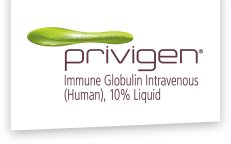Important Safety Information
WARNINGS:
- Thrombosis (blood clotting) can occur with immune globulin products, including Privigen. Risk factors may include advanced age, prolonged immobilization, a history of blood clotting or hyperviscosity (thick blood), use of estrogens, installed vascular catheters, and cardiovascular risk factors.
- In predisposed patients, kidney malfunction and acute kidney failure, potentially fatal, can occur with the administration of human immune globulin intravenous (IGIV) products. Kidney problems occur more commonly in patients receiving IGIV products that contain sucrose. Privigen does not contain sucrose.
- If you are at high risk of thrombosis or kidney problems, your doctor will prescribe and administer Privigen at the minimum dose and infusion rate practicable, and will monitor you for signs and symptoms of thrombosis and viscosity, as well as kidney function. Always drink sufficient fluids before administration.
See your doctor for a full explanation, and the full prescribing information for complete boxed warning.
Treatment with Privigen might not be possible if your doctor determines you have hyperprolinemia (too much proline in the blood) or are IgA-deficient with antibodies to IgA and a history of hypersensitivity. Tell your doctor if you have previously had a severe allergic reaction (including anaphylaxis) to the administration of human immune globulin. Inform your physician if you notice early signs of hypersensitivity reactions to administration of Privigen, including hives, tightness of the chest, wheezing, or shock.
Immediately report to your physician the following symptoms, which could be signs of serious adverse reactions to Privigen:
- A decrease in urine output, sudden weight gain, fluid retention, and/or shortness of breath following infusion (possible symptoms of kidney problems)
- Pain and/or swelling or discoloration of an arm or leg, shortness of breath, chest pain or discomfort that worsens on deep breathing, unexplained rapid pulse, and numbness or weakness on one side of the body (possible symptoms of a blood clot)
- Headache; a stiff neck; excessive drowsiness or fatigue; fever; sensitivity to light or painful eye movements; nausea; increased heart rate; yellowing of the skin or eyes, and/or dark-colored urine (possible symptoms of other conditions that may require treatment).
Privigen is made from human blood. The risk of transmission of infectious agents, including viruses and, theoretically, the Creutzfeldt-Jakob disease (CJD) agent and its variant (vCJD), cannot be completely eliminated.
Before receiving any vaccine, tell the immunizing physician if you have had recent therapy with Privigen, as the effectiveness of the vaccine could be compromised.
In clinical trials of Privigen, headache was the most common side effect seen in all conditions treated (PI, ITP, and CIDP). Other common side effects that can be seen with treatment include fatigue, nausea, fever, and high blood pressure. These are not the only side effects possible; see the full prescribing information for a complete list of adverse reactions possible with treatment for each condition. Alert your physician to any side effect that bothers you or does not go away.
Indications
Privigen®, Immune Globulin Intravenous (Human), 10% Liquid, is approved to:
- Treat types of primary immunodeficiency (PI).
- Raise platelet counts in patients over 15 with chronic immune thrombocytopenic purpura (ITP).
- Treat chronic inflammatory demyelinating polyneuropathy (CIDP) in adults. Talk with your doctor about the length of your therapy.
For more information about Privigen, please see full prescribing information.
You are encouraged to report negative side effects of prescription drugs to the FDA.
Visit http://www.fda.gov/medwatch, or call 1-800-FDA-1088.
You can also report side effects to CSL Behring's Pharmacovigilance Department at 1-866-915-6958.
